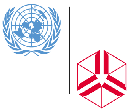
network of research and training centres and programmes
Issue 18: July-August 2002
 |
UNU Update | |
| The newsletter of United Nations
University and its network of research and training centres and programmes |
||
|
Issue 18: July-August 2002 |
||
As the United Nations marks the 57th anniversary this Wednesday of the signing of its founding charter, many Americans see the United Nations as a pretentious, ponderous and pompous non-power in world affairs. They believe it should scale down its ambitions to a much more modest level. The United States, of course, has much to be immodest about. The basic structure of the United Nations reflects the assumption of a world of five major powers. But today there is only one superpower, the United States, coexisting uneasily alongside only one overarching international organization. Americans bemoan the inability of the United Nations to bring rogue states to heel. Yet many non-American critics of the United Nations also despair at the periodic U.S. tendency to behave like a rogue superpower, responsible to no one but the U.S. Congress and the American voter. The terrorist attacks on America in September showed that the U.S. homeland is vulnerable to quarrels rooted in complex conflicts in distant lands. Outsiders hoped that Sept. 11 would change the United States and prompt it to re-engage with the international community. Yet it appears Americans concluded that Sept. 11 reduced their need to make concessions to the nebulous "international community" on vital national security issues. But U.S. power, wealth and politics are too deeply intertwined with the cross currents of international affairs for unilateral disengagement to be an option. The UN Security Council, the proper body for authorizing international use of military force, is bad at waging wars. As a result, maintaining world order in the past 50 years has depended more on United States than UN ability and will. The United States is uniquely qualified to be the sole superpower because it is a virtuous power. No other country, historically or in recent memory, has a better record of major power behavior. But Washington cannot construct a world in which all others have to obey universal norms and rules, while it can opt out whenever, as often, and for as long as it likes on such norms concerning nuclear tests, land mines, international criminal prosecution, climate change and other regimes. Peacekeeping will remain the instrument of choice for contemporary conflicts in places like Afghanistan, East Timor, Sierra Leone, the Balkans. Peacekeeping will thus define the United States-United Nations relationship. If Washington is perceived to be unwilling to support peacekeeping in messy conflicts in faraway countries, it will erode America's ability to harness UN legitimacy to causes and battles that may be more important to the United States, such as the war on terrorism. In addition to being the pivotal permanent member of the Security Council, the United States is the main financial underwriter of UN peace operations and exercises. It has unmatched influence on their establishment, mandate, nature, size, and termination. America's goal is to make UN peace operations efficient, cost effective and selective, increasing the professional military capabilities of the United Nations but leaving war fighting to multinational coalitions. The level of informed American interest about the United Nations is so low that any administration will always be able to distance itself from spectacular failures of UN peacekeeping, as with Somalia and Srebrenica. Washington was jointly culpable in both disasters. U.S. participation in enforcement operations under direct UN command can be ruled out. Its participation in other operations, whose creation requires U.S. consent, will be limited to providing key transport, communications and logistics units and skills, and bearing the main financial burden. UN peace operations - some of which are coalitions of the unwilling, unable and unlike minded - are only one of many foreign policy tools available to the United States. Others include multilateral action through the North Atlantic Treaty Organization (Kosovo), ad hoc multinational coalitions (the Gulf War), or unilateral action if vital U.S. interests are involved. In non-UN operations, the United States would prefer to act after Security Council authorization, but will not accept that as a mandatory requirement for the use of military force overseas. The United States has an equally compelling interest in promoting the norm that the United Nations is the only acceptable legitimator of international military action for all except the United States and NATO. Washington thus faces a tough dilemma between instilling the principle of multilateralism as the norm of world order, and exempting itself from the same principle because of a strong belief in exceptionalism - and in its identity as the virtuous power. |
||
|
Copyright © 2002 United Nations University. All rights reserved. |